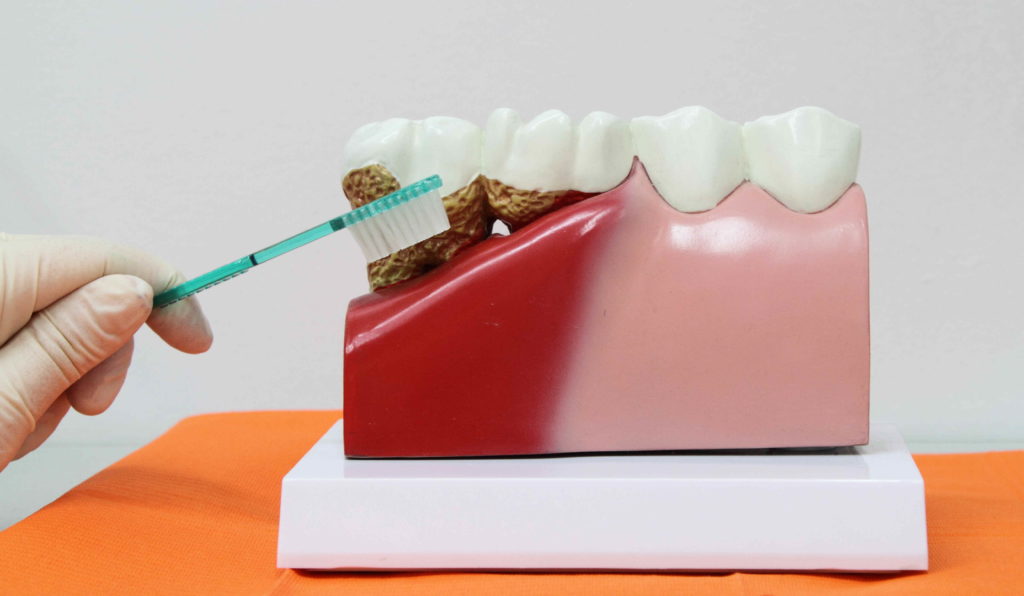Periodontitis is often the consequence of gingivitis. Often painful, it generally causes bad breath and swollen gums. What factors lead to periodontal disease? How can you treat it and prevent its onset? Find out all the answers to these questions in our article.
What is periodontitis?
Periodontitis is a periodontal disease that affects the supporting tissues of the teeth, including the gums, cementum, ligament and alveolar bone. It can be severe or aggressive, depending on its characteristics. Periodontitis often follows gingivitis, i.e. inflammation of the gums. It corresponds to acute inflammation.
Symptoms include reddening and swelling of the gums, sometimes with suppuration. On examination, the dentist finds a loss of attachment of the ligament (which connects the tooth to the bone) and mobility of the teeth. It can be accompanied by pain, discomfort and halitosis (bad breath).
What causes periodontal disease?
This disease is caused by the accumulation of plaque on the teeth. This can lead to a number of dental problems, including gingivitisInflammation of the gums can lead to bleeding and loosening of the teeth. If plaque is not removed by a specialist, it can accumulate and harden into tartar. Tartar is more difficult to remove than plaque and can cause more severe gum inflammation, called periodontitis.
Factors that increase the risk of developing periodontitis include:
- the presence of specific bacteria (such as Porphyromonas gingivalis),
- poor dental hygiene,
- smoking,
- alcohol consumption,
- malnutrition,
- certain medications,
- hormonal disorders (particularly during pregnancy or menopause),
- an ill-fitting dental crown (if it doesn't allow for rigorous dental hygiene, it encourages plaque build-up),
- diabetes,
- HIV,
- the stress,
- aging.
What's more, people with periodontitis may have reduced immunity and be more susceptible to bacterial pathogens.
What impact does periodontitis have on oral health?
In fact, it's a chronic disease that can lead to tooth loss if not treated in time. The bacteria present in plaque produce toxins that can affect the supporting tissues of the teeth, leading to inflammation of the gums and bone loss around the teeth. Periodontal pockets can then form, allowing bacteria to penetrate deeper into the supporting tissues and worsening the disease.
How is periodontitis treated?
Your periodontist will perform the appropriate periodontal treatment: thorough scaling, polishing, root planing, curettage and/or gum grafting. Treatments can be surgical, and often require local anaesthetic. Depending on the situation, dental implants may be required to replace teeth lost to periodontitis.
Treatment also involves rigorous oral hygiene and changes to harmful lifestyle habits (mainly smoking cessation).
Dental X-rays can also be useful for diagnosing and monitoring oral health. In fact, a periodontologist can take a dental X-ray to assess the damage caused by bacterial attack. These images will help him/her to diagnose and choose the most appropriate solution for your situation.
HELVIDENT dental centers are equipped with state-of-the-art technology. Our team uses digital X-rays to reduce the dose of X-rays received by patients.
How can you prevent periodontal disease?
Swiss dentists recommend maintaining a high level of good oral hygiene to prevent periodontitis and other dental diseases. These include:
- Brush your teeth at least twice a day, for two minutes at a time, using a soft toothbrush and fluoride toothpaste,
- flossing, interdental brushing or spraying,
- immediate consultation in the event of bleeding gums or tooth mobility
- regular visits to the dentist to detect the onset of periodontitis in good time.
The risk of periodontitis can be reduced by adopting appropriate preventive measures and dental care.
The HELVIDENT team includes a periodontologist. She is a dentist specialized in this type of dental pathology, which she treats on a daily basis. Please do not hesitate to contact us for more information on our dental treatments or to make an appointment with our periodontologist.

